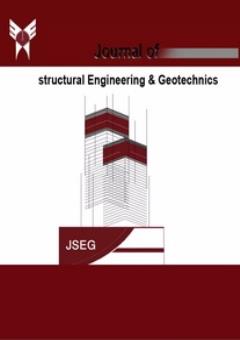A Parametric Study of Interactions Between Liquefaction Sand Lenses and Shallow Tunnels Under Earthquake Loads
محورهای موضوعی : Structural Engineering
Mohammad Shabani Soltan Moradi
1
![]() ,
Mohammad Azadi
2
,
Mohammad Azadi
2
![]() ,
Homayoon Jahanian
3
,
Homayoon Jahanian
3
1 - Department of Civil Engineering, Qazvin Branch, Islamic Azad University, Qazvin, Iran.
2 - Department of Civil Engineering, Qazvin Branch, Islamic Azad University, Qazvin, Iran
3 - Department of Civil Engineering, Qazvin Branch, Islamic Azad University, Qazvin, Iran
کلید واژه: Liquefaction, tunnel, Effective stress, sand lens, pore water pressure,
چکیده مقاله :
If the saturated sand lenses are placed around the tunnels under the force of the earthquake, liquefaction will occur in them. This will cause settlement of the ground surface and changes in forces and anchors on the tunnel lining. For this purpose, it is important to evaluate the change of different parameters of the sand lens and the change of the thickness of the tunnel lining in the part of the sand lens and the changes in the diameter and depth of the tunnel as well as the location of the sand lens considering the tunnel inside it. Therefore, this article investigates the mentioned changes in shallow tunnels in the location of sand lens in flowing soils surrounded by clay. In this article, FLAC 3D software is used to determine changes in pore water pressure and effective stress reduction after sand lens liquefaction. Based on the obtained results, if the sand lenses are placed at a depth of less than 10 meters, they increase the land surface subsidence by 36% compared to the reference model B, with an increase of 2 meters in the depth of the sand lens compared to the reference model B, the value of the maximum bending anchor and axial force on the tunnel lining increases by 35.7% and 14.4%, respectively, in the sand lens part. The findings of the present study can be very useful in the decision-making process of tunnels that are dug inside flowing sand lenses.
If the saturated sand lenses are placed around the tunnels under the force of the earthquake, liquefaction will occur in them. This will cause settlement of the ground surface and changes in forces and anchors on the tunnel lining. For this purpose, it is important to evaluate the change of different parameters of the sand lens and the change of the thickness of the tunnel lining in the part of the sand lens and the changes in the diameter and depth of the tunnel as well as the location of the sand lens considering the tunnel inside it. Therefore, this article investigates the mentioned changes in shallow tunnels in the location of sand lens in flowing soils surrounded by clay. In this article, FLAC 3D software is used to determine changes in pore water pressure and effective stress reduction after sand lens liquefaction. Based on the obtained results, if the sand lenses are placed at a depth of less than 10 meters, they increase the land surface subsidence by 36% compared to the reference model B, with an increase of 2 meters in the depth of the sand lens compared to the reference model B, the value of the maximum bending anchor and axial force on the tunnel lining increases by 35.7% and 14.4%, respectively, in the sand lens part. The findings of the present study can be very useful in the decision-making process of tunnels that are dug inside flowing sand lenses.


